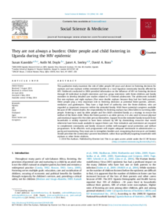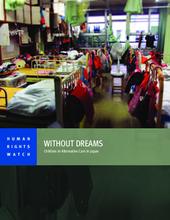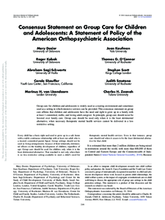Displaying 12111 - 12120 of 14348
This qualitative study examines the role of older people (60 years and above) in fostering decisions for orphans and non-orphans within extended families in a rural Ugandan community heavily affected by HIV.
In this piece from Radio Australia, Phil Kafcaloudes interviews Tara Winkler, an Australian woman who set up an orphanage in Cambodia at the age of 21 and who has since changed her mind about institutional care.
This article highlights the historical role churches have played in child protection stemming from biblical teachings and mandates as well as a current example of church involvement in child protection.
This report by Human Rights Watch examines Japan’s alternative care system for children. It describes its organization and processes, presents current data on the use of different forms of alternative care and highlights the problems found in the institutionalization of most children (including infants), as well as abuses that take place in the system.
La investigación es un trabajo en conjunto entre DONCEL, GUÍA EGRESO y&
This review takes a three-pronged approach to showing why the dearth of sociological research focused on children in foster care is problematic.
La terrifiante épreuve d’une fillette reflète ce que vivent des milliers d’enfants emportés par le conflit au Soudan du Sud : séparés de leur famille, ils se retrouvent seuls et ont besoin d’une aide urgente.
This statement of policy of by American Orthopsychiatric Association reviews the evidence on the use of congregate or group care for children and adolescents and concludes that institutional care is nonoptimal for children of all ages, including teenagers, and that even smaller group care settings can be detrimental to the growth and well-being of youth.
Comment les réseaux sociaux solides soutiennent les enfants d’Afrique subsaharienne et leurs familles. Les enfants et les familles vulnérables ont besoin d’un système de soutien social qui réponde aux problèmes qu’ils rencontrent grâce à des solutions efficaces et durables. Les observations présentées dans ce rapport sont un « cliché instantané » des pratiques prometteuses en matière de développement et de pérennité de la communauté.
La pratique répandue au Japon de placer des enfants vulnérables dans des institutions au lieu de foyers familiaux prive des milliers d’entre eux de l’opportunité de se préparer à une vie productive et indépendante au sein de la société japonaise, a déclaré Human Rights Watch dans ce nouveau rapport.





